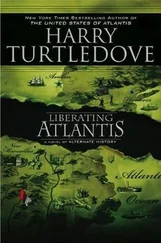Harry Turtledove - Opening Atlantis
Здесь есть возможность читать онлайн «Harry Turtledove - Opening Atlantis» весь текст электронной книги совершенно бесплатно (целиком полную версию без сокращений). В некоторых случаях можно слушать аудио, скачать через торрент в формате fb2 и присутствует краткое содержание. Жанр: История, на английском языке. Описание произведения, (предисловие) а так же отзывы посетителей доступны на портале библиотеки ЛибКат.
- Название:Opening Atlantis
- Автор:
- Жанр:
- Год:неизвестен
- ISBN:нет данных
- Рейтинг книги:4 / 5. Голосов: 1
-
Избранное:Добавить в избранное
- Отзывы:
-
Ваша оценка:
- 80
- 1
- 2
- 3
- 4
- 5
Opening Atlantis: краткое содержание, описание и аннотация
Предлагаем к чтению аннотацию, описание, краткое содержание или предисловие (зависит от того, что написал сам автор книги «Opening Atlantis»). Если вы не нашли необходимую информацию о книге — напишите в комментариях, мы постараемся отыскать её.
Opening Atlantis — читать онлайн бесплатно полную книгу (весь текст) целиком
Ниже представлен текст книги, разбитый по страницам. Система сохранения места последней прочитанной страницы, позволяет с удобством читать онлайн бесплатно книгу «Opening Atlantis», без необходимости каждый раз заново искать на чём Вы остановились. Поставьте закладку, и сможете в любой момент перейти на страницу, на которой закончили чтение.
Интервал:
Закладка:
"Never mind," Victor said in the same language. "If you knew, you would have killed him."
A couple of other recruits came over to stare at their fallen comrade. "Godalmighty!" one of them said. "What happened to him?"
"He offended the sergeant here." Victor pointed to Blaise. "And he found out that wasn't such a good idea, didn't he?"
"Sure did." The man looked from Aeneas Hand to Blaise and back again. "Offended him, did he? If he really went and got him mad, I reckon he'd be in pieces."
"Wouldn't be surprised," Victor Radcliff agreed. "Fetch a pail of water and souse Aeneas with it. He's learned a lesson. I hope nobody else in this company has to."
Hand had begun to stir by the time the water cascaded over him. Sure enough, it revived him. Blearily, he looked up at Blaise. "You don't fight fair," he said.
"Fight fair? Fight fair?" That startled the black man out of English and into profane French: "Sacre merde!" Blaise thought for a moment before going on, in English again, "You right. I no fight fair. I fight, I win. Only way to fight. I sergeant." He tapped his stripes. "You mess me again, I kill you. Understand?"
Aeneas Hand nodded, then winced and looked as if he wished he hadn't. Water dripped off his chin and from the end of his pointed nose. "Reckon I do."
"Reckon I do, what?" Blaise touched the chevrons again.
"Reckon I do, Sergeant," the big recruit allowed.
"Good." Blaise allowed himself a smile. He reached down and hauled Hand upright. "We get on now."
And they did. Having been so thoroughly beaten, Aeneas Hand spread the word that Blaise was sudden death on two legs. A couple of smaller incidents with other recruits did nothing to show he was wrong. Victor Radcliff began to wonder whether he or his man would have worn the epaulets had Blaise been born with a white skin.
Gravediggers' spades tore into the soft brown earth. Dirt thudding on dirt had an ominously final sound. Roland Kersauzon watched as a priest gabbled quick Latin over the shrouded corpse, then jumped away. A sickly-sweet stench rose from the body. It wasn't because the young soldier had stayed unburied too long; he'd died that night, only a few hours before this dawn. But smallpox had its own fetor.
Roland muttered to himself. Too many soldiers were dying of smallpox and measles. Men who grew up on farms out in the countryside and spent their lives alone in the woods missed the diseases in childhood, when they were most often milder. Catch them then and you were immune forever after. Catch them as an adult…
He rubbed his arm. He had smallpox scars there, but nowhere else. He'd missed the sickness as a boy himself. He'd been inoculated with it at Nouveau Redon and taken a light case. Now he was as immune as if he'd been through a harsh bout caught by accident.
Inoculation had come to the French settlements from the English, to Atlantis from England, and to England, he'd heard, from Turkey. He wondered how widely it was practiced in English territory here. Were the English settlements' recruits less likely than his own men to come down sick? He hoped not-that could decide who won the war.
The gravediggers tipped the corpse into the hole they'd made. Both of them had smallpox-slagged faces; they feared no contagion. The priest was unmarked. No wonder he didn't want to stay by the body a moment longer than he had to. But a dying man, or a dead one, needed a hope of heaven. If a priest wouldn't shrive him, he'd surely go to hell instead.
If a priest died after shriving a few men, what then?
Then you find another priest, Roland thought, with luck a man who carries the scars on his own face. That would be more…economical. Till this moment, Kersauzon had never thought of priests as expendable munitions of war, but they were. That they were also other things didn't mean they weren't.
A veteran sergeant-one who bore the marks on his face-came up to Roland and saluted. Voice as mechanical as an artisan's automaton, he said, "Monsieur, I'm sorry to have to report to you that in my company alone we have another half a dozen sick. Two of them, I fear, aren't at all well."
If a veteran sergeant said something like that, the priest would perform his office again before long. "Nom d'un nom!" Roland burst out. "So many, and just from your company?"
"Oui, Monsieur." Who would have imagined the underofficer's voice could become even more colorless than it was already?
"And other companies will be reporting similar calamities?" Kersauzon persisted.
"If they are honest, I think they will."
"How are we to go forward with so much sickness?"
The sergeant didn't answer that, not in words. His eyebrows said, You're the commander. Why are you troubling me with that? It's your worry. And it was. Kersauzon sighed. "Thank you for letting me know. You're dismissed." He received another precisely machined salute, and the underofficer made his exit.
Other sergeants and lieutenants did report sickness in their men. One lieutenant reported himself unwell. The hectic flush on his face and a bright glitter in his eye said he'd be worse before long. Roland said nothing of that past telling him to lie down and take it easy.
"But we're in English territory, Monsieur," the young officer protested. "We should move forward."
"We will-in a while," Roland said. "But we need to have a healthy army if we are to fight with any hope of victory, n'est-ce pas?"
"Oui," the lieutenant said, and argued no more.
More and more reports came in. "This is a disaster!" Kersauzon cried. He'd expected the bloody flux among his men. But so many casualties from smallpox and measles took him by surprise.
The corporal who'd brought the latest word of men down with smallpox-and of others afraid to get anywhere near them-shrugged then. The marks on his face said he'd been through the disease and come out the other side. "It's war, Monsieur," he replied.
"But if I attack now, it will be like trying to strike with a broken hand," Roland said.
Another shrug from the corporal. "Then don't attack, Monsieur. Wait for the English to come to you. Chances are their army will have as much sickness as ours."
Fifty years earlier, that assuredly would have been true. But, if the English inoculated more than his own side did, smallpox would trouble them less. And he knew they did inoculate more. The procedure had its risks; every once in a while, someone came down with a bad case of smallpox instead of the mild dose that gave immunity. Most of the time, though, a wild case was far more dangerous.
He consoled himself by remembering that the English couldn't inoculate for measles or fluxes of the bowels. And not all of their soldiers would have had pus from a smallpox sore rubbed into a cut on the arm. Some would still catch the disease on their own. Some, yes, but how many?
Fewer than were catching it among his own troops. Roland Kersauzon was glumly sure of that. He dismissed the corporal with more respect than he usually gave underofficers. The man had helped him make up his mind, which was more than that miserable lieutenant had done.
He stood on English territory. He decided he would stand for a while, till the sickness burned through his army and burned itself out. Freetown could wait.
Victor Radcliff rode into New Hastings from the north. Blaise rode with him. The Negro had never ridden a horse till he escaped from bondage. No one would ever mistake him for a polished equestrian now, but he stayed on the gelding and didn't complain about being saddlesore…though he did walk with the bowlegged gait of a man with rickets.
New Hastings' narrow, winding streets and half-timbered houses made Victor wonder if the Tudor age really had passed away. He laughed at himself as that went through his mind. The town was older than the Tudors; its founding lay in Plantagenet times. Plantagenets, Tudors, Stuarts-all gone. New Hastings went on.
Читать дальшеИнтервал:
Закладка:
Похожие книги на «Opening Atlantis»
Представляем Вашему вниманию похожие книги на «Opening Atlantis» списком для выбора. Мы отобрали схожую по названию и смыслу литературу в надежде предоставить читателям больше вариантов отыскать новые, интересные, ещё непрочитанные произведения.
Обсуждение, отзывы о книге «Opening Atlantis» и просто собственные мнения читателей. Оставьте ваши комментарии, напишите, что Вы думаете о произведении, его смысле или главных героях. Укажите что конкретно понравилось, а что нет, и почему Вы так считаете.












